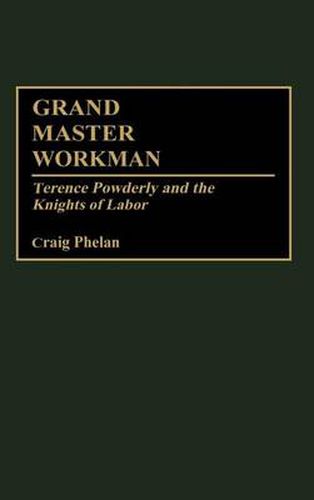Readings Newsletter
Become a Readings Member to make your shopping experience even easier.
Sign in or sign up for free!
You’re not far away from qualifying for FREE standard shipping within Australia
You’ve qualified for FREE standard shipping within Australia
The cart is loading…






The Noble Order of the Knights of Labor was the most ambitious and significant labour organization of the Gilded Age. As the charismatic leader of this group, Terence Powderly was America’s first nationally known labour leader, the first to achieve a high degree of recognition from working people, industrialists and politicians across the continent. To most Americans, Powderly was the Knights of Labor. Based on an examination of Powderly’s voluminous correspondence, this is a critical analysis of Powderly’s efforts to oversee the most spectacular experiment in class-wide solidarity ever undertaken. Craig Phelan seeks to paint a sympathetic and probing portrait of a complex figure caught up in the whirlwind of local and national events. He details the challenges and pressures of labour leadership at a time when industrialization was convulsing the nation, and when the layout movement was struggling to build a viable national institution capable of creating a more egalitarian society. The national focus of this study should help to synthesize the numerous community studies written on the Knights and offer fresh perspectives on the ultimate meaning of the organization.
$9.00 standard shipping within Australia
FREE standard shipping within Australia for orders over $100.00
Express & International shipping calculated at checkout
The Noble Order of the Knights of Labor was the most ambitious and significant labour organization of the Gilded Age. As the charismatic leader of this group, Terence Powderly was America’s first nationally known labour leader, the first to achieve a high degree of recognition from working people, industrialists and politicians across the continent. To most Americans, Powderly was the Knights of Labor. Based on an examination of Powderly’s voluminous correspondence, this is a critical analysis of Powderly’s efforts to oversee the most spectacular experiment in class-wide solidarity ever undertaken. Craig Phelan seeks to paint a sympathetic and probing portrait of a complex figure caught up in the whirlwind of local and national events. He details the challenges and pressures of labour leadership at a time when industrialization was convulsing the nation, and when the layout movement was struggling to build a viable national institution capable of creating a more egalitarian society. The national focus of this study should help to synthesize the numerous community studies written on the Knights and offer fresh perspectives on the ultimate meaning of the organization.